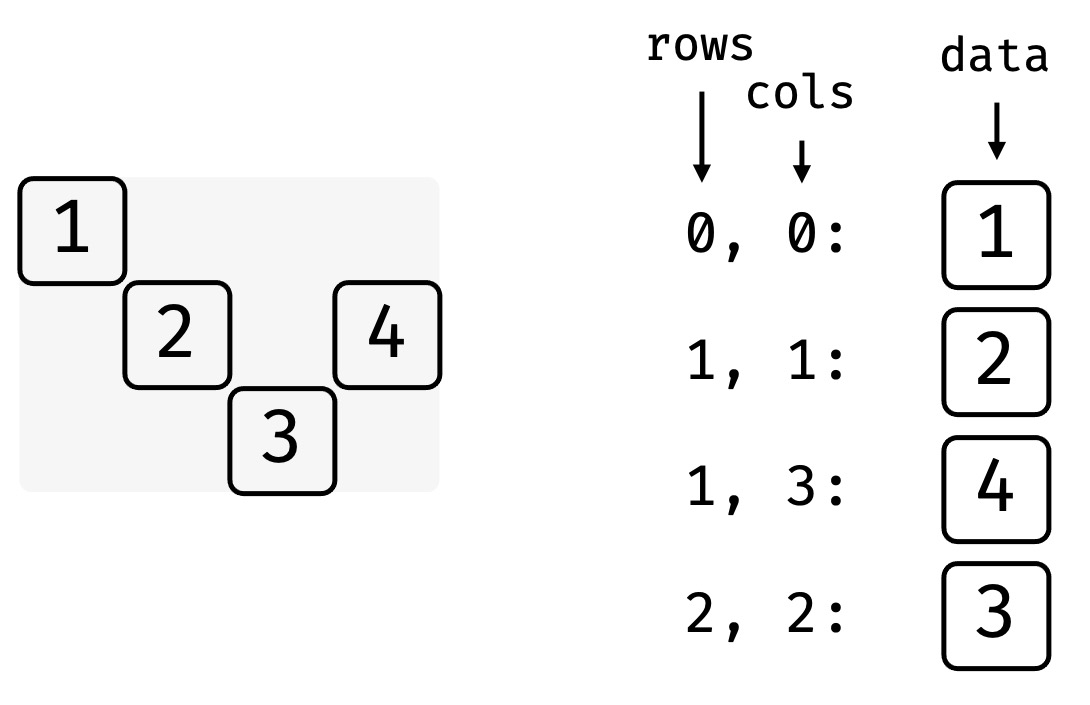bsparse.sparse.COO#
- class COO(rows, cols, data, shape=None, dtype=None, symmetry=None)#
A sparse matrix in coordinate format.
The
COOclass represents a sparse matrix using three arrays:rows: contains the row coordinates of the non-zero elements.
cols: contains the column coordinates of the non-zero elements.
data: contains the values of the non-zero elements.

During instantiation, the matrix is sorted (lexicographically) by rows and columns.
Duplicate elements are not allowed.
- Parameters:
- rowsarray_like
The row coordinates of the non-zero elements.
- colsarray_like
The column coordinates of the non-zero elements.
- dataarray_like
The values of the non-zero elements.
- shapetuple, optional
The shape of the matrix. If not given, it is inferred from the row and column indices.
- dtypenumpy.dtype, optional
The data type of the matrix elements. If not given, it is inferred from the data array.
- symmetrystr, optional
The symmetry of the matrix. If not given, no symmetry is assumed. This is only applicable for square matrices, where possible values are
'symmetric'and'hermitian'. Note that when setting a symmetry, the lower triangular part of the matrix is discarded.
Examples
>>> rows = [0, 1, 2, 2, 3] >>> cols = [1, 2, 2, 3, 4] >>> data = [1, 2, 3, 4, 5] >>> coo = COO(rows, cols, data, shape=(4, 5)) >>> coo.toarray() array([[0, 1, 0, 0, 0], [0, 0, 2, 0, 0], [0, 0, 3, 4, 0], [0, 0, 0, 0, 5]])
- Attributes:
- rowsndarray
The row coordinates of the non-zero elements.
- colsndarray
The column coordinates of the non-zero elements.
- datandarray
The values of the diagonals.
shapetuple[int, int]The shape of the matrix.
dtypedtypeThe data type of the matrix elements.
symmetrystrThe symmetry of the matrix.
nnzintThe number of stored elements in the matrix.
TCOOThe transpose of the matrix.
HCOOThe conjugate transpose of the matrix.
Methods
astype(dtype)Returns a copy of the matrix with a different data type.
conj()The complex conjugate of the matrix.
The complex conjugate of the matrix.
copy()Returns a copy of the matrix.
diagonal([offset])Returns the diagonal of the matrix.
from_array(arr[, symmetry])Creates a sparse matrix from a dense
numpy.ndarray.from_sparray(mat[, symmetry])Creates a sparse matrix from a
scipy.sparse.sparray.save_npz(filename)Saves the matrix as
.npzarchive.toarray()Converts the matrix to a dense
numpy.ndarray.tocoo()Converts the matrix to coordinate storage.
tocsr()Converts the matrix to compressed row storage.
todia()Converts the matrix to diagonal storage.
